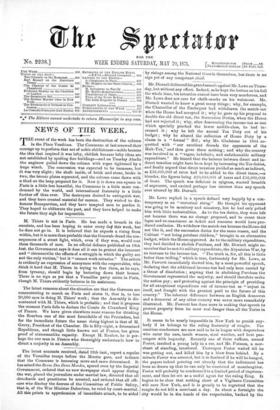Mr. Disraeli delivered his grand assault against Mr. Lowe onThurs-
day, but without any effect. Indeed, as he kept the button on his foil the whole time, his intention cannot have been very murderous, and Mr. Lowe does not care for chalk-marks on his waistcoat. Mr. Disraeli wanted to know a great many things ; why, for example, the Chancellor of the Exchequer had withdrawn the match-tax when the House had accepted it ; why he gave up his proposal to double the old direct tax, the Succession Duties, when the House had not rejected it ; why, after denouncing the income-tax as one which specially pinched the lower middle-class, he had in- creased it ; why he left the annual Tea Duty out of his budget ; why he altered the collection of House Duty by a clause in a " formal" Bill ; why Mr. Gladstone in 1864 co- quetted with " our excellent friends the opponents of the Malt-Tax," and then gave them nothing ; and why the country was involved in a " vague, indefinite, and unfathomable military expenditure." He hinted that the balance between direct and in- direct taxation might have been kept by increasing the Tea duties, and finally argued that direct taxation yielded as much as indirect, as £36,000,000 of rates had to be added to the direct taxes,—a blunder, the figures being £20,000,000 of taxes and £16,000,000 of loans. The speech was deficient in epigram, wanted breadth of argument, and excited perhaps less interest than any speech ever uttered by Mr. Disraeli.


































